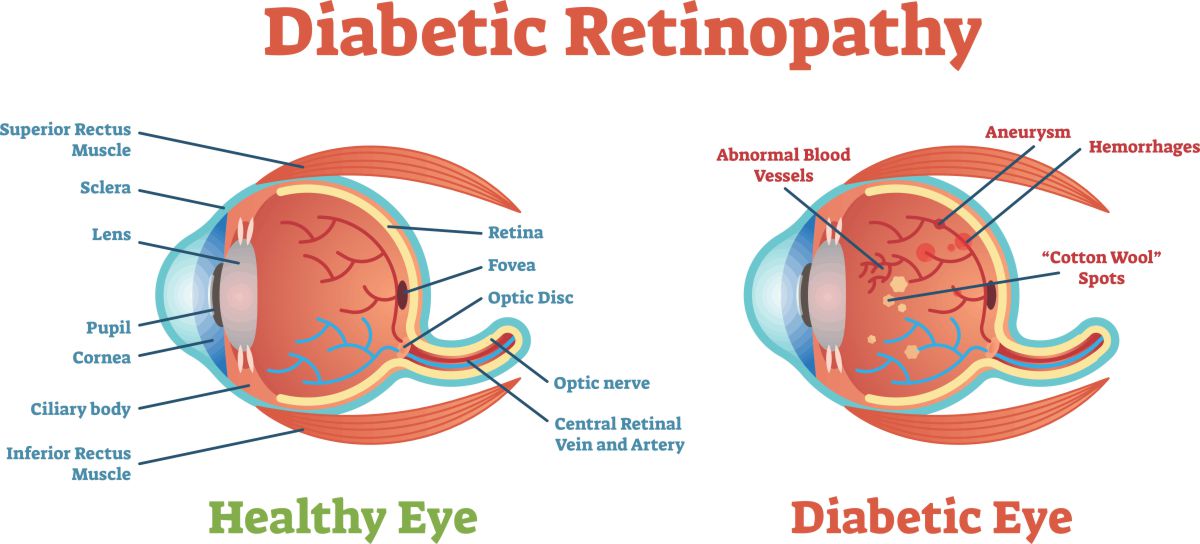As we reported in our last post, there are no early warning signs for diabetic eye disease, which is a leading cause of blindness. According to the National Eye Institute (NEI), early detection and treatment are key. That means, if you have diabetes, you should be sure to have a dilated eye examination at least once a year.
If you or someone you love has diabetes and has not had an eye examination in the past year, we encourage you to call Dr. Kathy Chriqui, a respected optometrist in Northridge for a complete eye exam.
Diabetic eye disease includes:
- Diabetic retinopathy: Damage to the blood vessels in the retina.
- Cataract: Clouding of the lens of the eye.
- Glaucoma: Increase in fluid pressure inside the eye that leads to optic nerve damage and loss of vision.
Diabetic retinopathy is the most common form of diabetic eye disease – it is also a leading cause of blindness in American adults. Changes in the blood vessels of the retina are the underlying cause. "In some people with diabetic retinopathy, retinal blood vessels may swell and leak fluid," the NEI explains. "In other people, abnormal new blood vessels grow on the surface of the retina. These changes may result in vision loss or blindness."
Unfortunately, there are often no symptoms in the early stages of diabetic retinopathy. You won't feel any pain and you may not even notice changes in your vision until thedisease has progressed. "Even in more advanced cases, the disease may progress a long way without symptoms," the NEI says. "This symptomless progression is why regulareye examinations for people with diabetes are so important."
Diabetes can damage the tiny blood vessels inside the retina, which is the light-sensitive tissue at the back of your eye. And, as the NEI reminds us, "A healthy retina is necessary for good vision."
According to the NEI, between 40 to 45 percent of Americans diagnosed with diabetes have some stage of diabetic retinopathy. Both those with type 1 and type 2 diabetes are at risk for the disease. Women with diabetes who become pregnant should be especially concerned. "To protect vision, every pregnant woman with diabetes should have a comprehensive dilated eye exam as soon as possible," the NEI says. People who have had diabetes for a long time are also more likely to develop diabetic retinopathy.
Dr. Chriqui, a trusted eye doctor in Northridge, CA, has the necessary training and experience to provide screening for diabetic retinopathy. She can also talk to you about treatment to help prevent its progression.
Please don't wait until you have symptoms! By then, the disease will have progressed.
"If you have diabetic retinopathy, at first you may notice no changes to your vision," the NEI says. "But over time, diabetic retinopathy can get worse and cause vision loss.Diabetic retinopathy usually affects both eyes."
We'll say it again, because it is so important: An annual eye exam is essential when it comes to protecting the eyesight of those with diabetes. "Your eyes should be dilated during the exam, which means eyedrops are used to enlarge your pupils," the NEI clarifies. "This dilation allows the eye care professional to see more of the inside of your eyes to check for signs of the disease."
The National Eye Health Education Program says that early detection is more important now than ever. That's because for the first time in decades, new treatments have been introduced that are even more effective.
"Laser surgery and appropriate follow-up care can reduce the risk of blindness by 90 percent," the NEI says. "However, laser surgery often cannot restore vision that has already been lost, which is why finding diabetic retinopathy early is the best way to prevent vision loss."
Why take chances? If you or a family member has diabetes, call Optometrics, the Northridge eye clinic people know and trust, and schedule an appointment with Dr. Chriqui.
Northridge optometrist Dr. Chriqui received her Doctor of Optometry degree from the Southern California College of Optometry. She practiced in Beverly Hills for 10 years before relocating to the Valley over 20 year ago. She also served as a staff doctor at the Southern California College of Optometry and was on staff at Cedar Sinai Medical Center for more than 25 years.
She is affiliated with the American Optometric Association, the California Optometric Association, the Los Angeles County Optometric Society and the San Fernando Valley Optometric Society.

